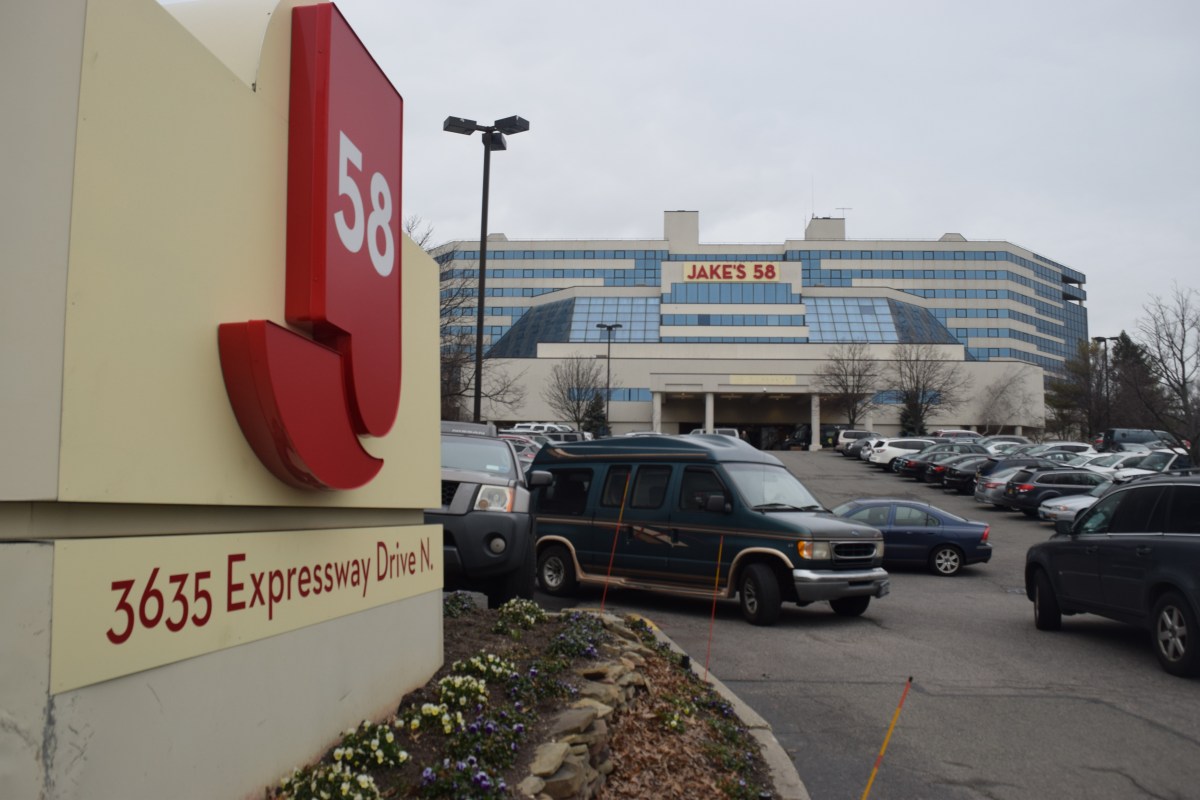The video lottery slots are up and running at Jake’s 58 in Islandia. So are the crowds—and the traffic. Still hanging overhead is a pending lawsuit filed last September by Concerned Citizens of Suffolk County in State Supreme Court claiming that the Village of Islandia broke the law when it permitted any gambling at the site of the former Marriott.
“We believe that in addition to the numerous procedural deficiencies surrounding the issuance of this permit, the operation of a gaming facility is not a permitted use in Islandia under the code of the Village of Islandia,” said Ira Bezack, a Hauppauge resident and Melville lawyer, who’s the in-house counsel for this citizens’ group.
According to him, Islandia code explains why the new owners don’t even use the words “hotel and casino” on the side of the building. Jake’s 58 may be an inscrutable name to drivers whizzing by on the Long Island Expressway, but it links the LIE exit number to Jeremy Jacob, the owner of Delaware North, the Buffalo-based gaming and entertainment operator which opened the facility about a month ago.
“We’ll be a good neighbor,” Chuck Kilroy, the president and general manager of the hotel and casino, told the Press last month. “I think people will be pleasantly surprised at how the property operates and how we’ll become a member of the community.”
With a contract from Suffolk County Regional Off-Track Betting Corporation, Delaware North opened up Suffolk County’s first gambling venue on Feb. 27 with 265 video lottery terminals (VLTs) on hand. Now it has almost 300 VLTs and plans to install 1,000 by the summer.
Suffolk OTB President Phil Nolan, former Islip Town supervisor, has said publicly that he expects the facility’s first 1,000 machines to be insufficient, and intends to ask the State Legislature to allow Jake’s 58 to expand to 2,000 VLTs.
“I don’t think that Delaware North put in $32 to $34 million into renovating this hotel in Islandia for a thousand VLT machines,” said Bezack. “I think this is an investment in the hope that Governor Cuomo or anybody who’s sitting in that office will eventually allow the same type of gambling in New York that they have in Connecticut.”
Suffolk OTB is hoping that the slots-only casino will pay off big time, enabling it to emerge from bankruptcy—it filed for Chapter Nine protection on May 2012 before Chief Judge Carla Craig in U.S. Bankruptcy Court in Brooklyn—and unload its debt. It owes $3 million to the New York Racing Association, plus at least $15 million to its other creditors, which includes Delaware North. Some observers say the actual figure is three times that amount. But if all goes as planned, OTB says the new venue will let it pay $13 million to Suffolk County for its first decade of operation.
Suffolk OTB’s Nolan reportedly said that he expects the organization to be completely out of the red in five years and eventually be able to ostensibly contribute an estimated $73.9 million annually to public education.
Critics of the casino don’t see how that’s going to happen, given Suffolk OTB’s debt burden. But other factors may be at work as well. According to a study of gambling conducted by the Nelson A. Rockefeller Institute of Government in Albany, revenues from video lottery terminals drop precipitously the longer the parlors stay open.
“The actual revenue collections are always below the expected revenue forecasts,” Lucy Dadayan, the senior researcher who ran the study in 2016, told Newsday, adding that Jake’s 58 would surely succumb to the same fate.
There wouldn’t be one VLT in Suffolk had not Albany granted OTB the right to operate gaming machines in the 2013 law pushed by disgraced ex-State Sen. Dean Skelos, who is appealing his conviction on federal corruption charges. The former New York Senate majority leader’s measure gave Nassau OTB and Suffolk OTB the right to place 1,000 video slots within their county lines.
Nassau OTB couldn’t find the right location to overcome community objections, and ended up leasing its share to Resorts World Casino New York City, which installed them at its Aqueduct Racetrack in Queens. Originally, Suffolk OTB tried to make a deal in Medford, but met community opposition. Then the Village of Islandia stepped in, thanks to three-term incumbent Mayor Allan Dorman. Coincidentally or not, when the Islandia Marriott along Exit 58 by the Expressway went up for sale, Delaware North swept in last summer.
One of the plaintiffs in the pending lawsuit, which was filed last September, is former Islandia Deputy Mayor Neil Munro, who just ran against Dorman on March 21 and lost. It was reportedly Dorman’s first hotly contested election in a decade. Among the allegations in the suit before Judge William Ford in Riverhead are that the village approved the special permit to operate the casino “in less than two minutes,” according to attorney Paul Sabatino, Bezack’s co-counsel in the suit along with Anton Borovina. Sabatino told the Press that the resolution wasn’t even written down until “several days after the vote.”
Mayor Dorman did not respond to requests for comment.
Last week, Dorman handily defeated Munro, 507 to 258. Dorman, 66, president of the Suffolk County Village Officials Association, has lived in Islandia for 38 years. He heartily supported the casino contract, saying that it brought jobs and allowed the village to cut garbage collection fees while providing free senior bus service. His challenger, Munro, 54, who’s lived in Islandia 31 years, was a village trustee from 2005 to 2009, as well as deputy mayor. He’s a manager at Staller Associates, a real estate company in Islandia. Besides defeating Munro, Dorman cemented his support on the village board by knocking off a challenge from former Deputy Mayor Diane Olt, who was running for trustee.
“I don’t agree to a casino without a public referendum,” Munro told the Press. “It was jammed down everybody’s throat without discussing it.”
Frustrated by the recent election results while awaiting the court ruling on the casino permit, Munro and his allies met March 25. He said they saw many improprieties on Election Day, but did not expect the outcome to be overturned by the State Board of Elections. They plan to meet again next week.
According to Bezack, Delaware North has promised more than it can—or will—deliver. The company has agreed to pay the Village of Islandia $3.2 million annually, and coughed up $2.5 million before the recent election.
“That’s more than the village will ever see,” said Bezack. “In about a year and a half, their permit will expire and they’ll want to scale back their contribution significantly.”
Added Sabatino: “At a minimum, this entire project is taking on the look of a classic bait and switch, both economically and legally.”
He said that based on public comments, the economic viability of the casino depends on its getting 2,000 VLTs, despite the state statute’s limit. He also claimed that the New York Gaming Commission should not have granted the casino’s operating license, because under state law, the facility had to be in compliance with all of Islandia’s code provisions. His side argues that it was not.
“If the case is decided on the law, we should win,” said Bezack, “but unfortunately this is not a legal issue—it’s a political issue. The State of New York wants it, the County of Suffolk wants it, the Village of Islandia wants it. Now, is this judge going to buck politics? Or is he going to decide the case on the law? We are hopeful that Justice Ford, as is his duty, will decide the case on the law and not be swayed by political concerns.”
The plaintiffs contend that if Jake’s 58 is engaged in business activity not permitted by village code, then it should not be permitted to continue, let alone bring in hundreds more VLTs.
“I’m a vigorous opponent of the expansion of gambling,” said Assemb. Michael Fitzpatrick (R-Smithtown), whose district includes Jake’s 58. “I believe OTB should be allowed to fail. For government to go into the business of gambling to support its operation is bad public policy. It’s immoral in my view for government to be involved when we know a certain percentage of people will become addicted with real ramifications for families and businesses.”
Last year, Fitzpatrick filed a bill to rescind the authorization for the video lottery terminals but couldn’t get a Republican co-sponsor in the State Senate, so it died in his Assembly committee. He told the Press he’ll try again this session in Albany because he wants OTB “to go away and cease to be a cancer on the body politic of Suffolk County.”
“The caution to the village,” Fitzpatrick warned, “is that sometimes municipalities get a little punch-drunk—there’s a sugar high from the money that comes in—and they end up committing to spending, for which revenue may not be available a few years down the line. They’re on the hook for these commitments… The village is certainly going to enjoy a short-term windfall, but the social cost is going to borne by the entire county.”
Islandia does not have its own police, fire or ambulance service, and so must depend on Suffolk to provide those services.
“I’m not against gambling,” said Bezack, the lead attorney for Concerned Citizens of Suffolk, “but there are so many other places in Suffolk County that are much more amenable, like Grumman out in Calverton. Gambling has its place, but not in a residential community. This is going to be a full-blown casino.”
Asked for comment about the issues raised by Jake’s 58, Suffolk County Executive Steve Bellone declined. Supposedly Jake’s 58 has been on a hiring spree, employing more than 300 staffers and dozens of security guards. The casino is open daily from 8 a.m. until 4 a.m.
Apparently, the county is betting that it will only continue.






























